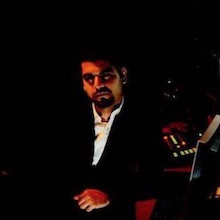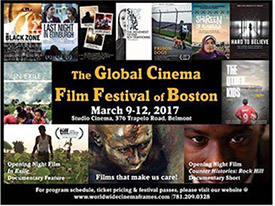Our dedication to Racial Equality and Social Justice (RESJ) spans decades. Learn more about our RESJ Initiative
Focused on the Human Condition

Raouf Jacob is a human rights activist and the Executive Director at WCF studios/films. Jacob "films to make people care" about human rights violations and the human condition around the globe. He is originally from war-torn Sierra Leone, West Africa. His family fled Sierra Leone at the climax of the barbaric civil war in 1999 and immigrated to Boston, MA in January of 2000. Jacob is now a documentarian and has written, produced and directed documentaries, spotlighting social and political injustice. His films include, “Cry, America,” which explored the tragic wake of Hurricane Katrina in 2005 and America’s war in Iraq.
The filmmaker also created the “In a Blind World” series, which explored Nazi Dictator Adolf Hitler’s “Final Solution of the Jewish Problem,” the Rwandan Genocide of 1994, the current ongoing genocide in Sudan’s western region of Darfur, the persecution of the Baha’i community in Iran and the reign of former warlord Pablo Escobar in The Republic of Colombia. “Sierra Leone: A Culture of Silence” is the filmmaker’s most recent multiple award winning documentary feature film. Jacob has collaborated and continues to work with Non Governmental Organizations around the world in hopes of raising awareness about human rights violations near and far.
 His company also presents the Global Cinema Film Festival, which provides a showcase for filmmakers from around the world who are spotlighting stories and issues that deserve global attention. The Film Festival runs March 9-12, 2017.
His company also presents the Global Cinema Film Festival, which provides a showcase for filmmakers from around the world who are spotlighting stories and issues that deserve global attention. The Film Festival runs March 9-12, 2017.
In 2014, after realizing he had “a void in his professional being,” Jacob enrolled in Cambridge College. “I needed to get a bachelor’s because it was one of the things in my box that was still unchecked. As someone with a production company, I wanted to acquire a good foundation in business and build on it.” He found that the flexibility of Cambridge College allowed him to transfer his college credits and “test out” of several courses, a process where students receive class credit if they demonstrate their capability through examinations in various subjects. These steps have enabled him to complete his management studies in one year. “My professors were encouraging and extremely helpful guides. They strengthened my ability to be a better business person. It was a beneficial process,” says Jacob.
“I found three teachers particularly inspiring. For example, Lucilia Valerio of the writing department was a very helpful mentor when I researched and wrote my capstone project. She was ‘the green light’ who really wants to see her students succeed, the kind and responsive teacher that every student is looking for.” According to Jacob, Alexa Jackson, who conducts the Diversity in the Workplace class, has one of the greatest challenges at Cambridge College—teaching a course that can spark many levels of controversy and tension. “I was most impressed with her skill to diffuse confrontational moments and raise our consciousness about respecting each other and embracing each other’s unique qualities.” Jacob says his statistics professor Mark Rotondo was a flexible, understanding teacher with “the special ability to spotlight students who dare to make a difference.” “He inspired me to dig deeper into statistical analysis of the film industry and was instrumental in helping me compose a very strategic business plan. I am speaking to you today because of Mark Rotondo.” Jacob has one more class this fall to complete his bachelors in management studies. Later this year he will apply to become a U.S. citizen. “It’s been quite a journey from a world so far away, in terms of culture, tradition, and ethical framework,” Jacob says, “but I embrace this world for the freedom and opportunity it has provided me.

